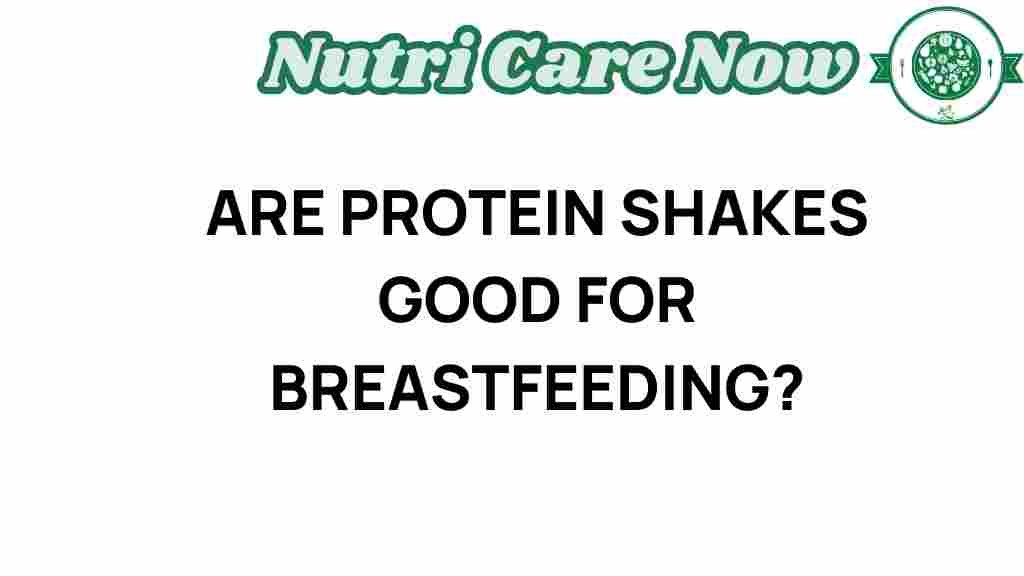The Truth About Protein Shakes and Breastfeeding: What You Need to Know
As a new mother, your body goes through significant changes, and proper nutrition becomes essential, especially during breastfeeding. One common query among nursing mothers is whether it’s safe to consume protein shakes while breastfeeding. This article will delve into the relationship between protein shakes, breastfeeding, and overall nutrition, providing valuable insights into health benefits, diet, weight management, and infant health during lactation.
Understanding Protein Shakes
Protein shakes are dietary supplements that provide a concentrated source of protein, often derived from whey, casein, soy, or plant-based sources. They are popular among fitness enthusiasts and busy individuals for their convenience and ability to support muscle recovery and weight management. However, when it comes to breastfeeding mothers, the question arises: are protein shakes safe and beneficial?
Nutrition Needs for Breastfeeding Mothers
Breastfeeding mothers have increased nutritional needs compared to non-lactating women. According to the World Health Organization, breastfeeding mothers should aim for a balanced diet that includes:
- Fruits and vegetables
- Whole grains
- Healthy fats
- Lean proteins
Incorporating protein shakes into your diet can help meet these increased protein requirements. The recommended protein intake for breastfeeding mothers is about 71 grams per day, which can vary based on individual factors like age, weight, and activity level.
Health Benefits of Protein Shakes for Breastfeeding Mothers
Protein shakes can offer several health benefits for new mothers who are breastfeeding:
- Supports Lactation: Adequate protein intake is vital for milk production. Protein shakes can help ensure that you meet your daily protein needs.
- Convenient Nutrition: With the demands of caring for a newborn, protein shakes provide a quick and easy nutritional option.
- Weight Management: Postpartum weight management can be challenging. Protein shakes can help you feel fuller for longer, reducing cravings and aiding in weight loss efforts.
- Muscle Recovery: For mothers who are active, protein shakes can support muscle recovery after workouts, helping maintain overall fitness.
- Infant Health: A well-nourished mother contributes to the health of her breastfeeding infant. The nutrients in protein shakes can support both mother’s and baby’s health.
Choosing the Right Protein Shake
Not all protein shakes are created equal. Here’s what to consider when selecting a protein shake while breastfeeding:
- Quality Ingredients: Look for shakes with high-quality protein sources and minimal additives. Natural or organic options are often better.
- Avoid Excess Sugar: Many protein shakes contain added sugars. Choose low-sugar options to maintain a healthy diet.
- Check for Allergens: If you have dietary restrictions or allergies (e.g., dairy or gluten), ensure the protein shake aligns with your needs.
- Consult Your Doctor: Before adding protein shakes to your diet, consult with a healthcare provider, especially if you have underlying health issues.
Incorporating Protein Shakes into Your Diet
Here’s a step-by-step guide to effectively incorporate protein shakes into your breastfeeding diet:
- Assess Your Protein Needs: Determine how much protein you currently consume and how much more you need to meet your dietary requirements.
- Select Your Shake: Choose a protein shake that meets the criteria discussed earlier. Ensure it aligns with your dietary preferences.
- Timing Matters: Consider when to consume your protein shake. Post-workout, as a meal replacement, or as a snack are all viable options.
- Pair with Other Nutrients: Enhance the nutritional value by adding fruits, vegetables, or healthy fats to your shake.
- Monitor Your Body’s Response: Pay attention to how your body reacts. If you experience any adverse effects, reconsider your choice.
Potential Concerns with Protein Shakes and Breastfeeding
While protein shakes can be beneficial, there are some potential concerns to keep in mind:
- Excessive Protein: Overconsumption of protein can lead to dehydration and kidney strain. Balance is key.
- Allergic Reactions: If your infant has allergies or sensitivities, be cautious about the ingredients in your protein shake.
- Impact on Milk Supply: Some protein shakes, particularly those with high sugar or unhealthy fats, may negatively impact milk supply.
Troubleshooting Tips for Protein Shakes and Breastfeeding
If you encounter issues while incorporating protein shakes into your breastfeeding diet, consider the following troubleshooting tips:
- Adjust Your Ingredients: If your shake is causing discomfort, try changing the protein source or adding digestive aids like ginger.
- Modify the Timing: If you feel sluggish after consuming a shake, try having it at a different time of day.
- Consult a Nutritionist: If you’re unsure about how to balance your diet, consider speaking with a registered dietitian.
Conclusion
In conclusion, protein shakes can be a beneficial addition to the diet of breastfeeding mothers when chosen wisely and consumed in moderation. They provide essential nutrients that support lactation, aid in weight management, and promote overall health. However, it is crucial to select high-quality shakes, monitor your body’s response, and consult healthcare professionals when necessary. Remember that a balanced diet, rich in whole foods, should be the foundation of your nutrition during this important time.
For more information on nutrition during breastfeeding, consider visiting the National Institutes of Health for comprehensive resources.
By prioritizing your nutritional needs, you can ensure both you and your baby thrive during this beautiful journey of motherhood.
This article is in the category Health and created by NutriCareNow Team
